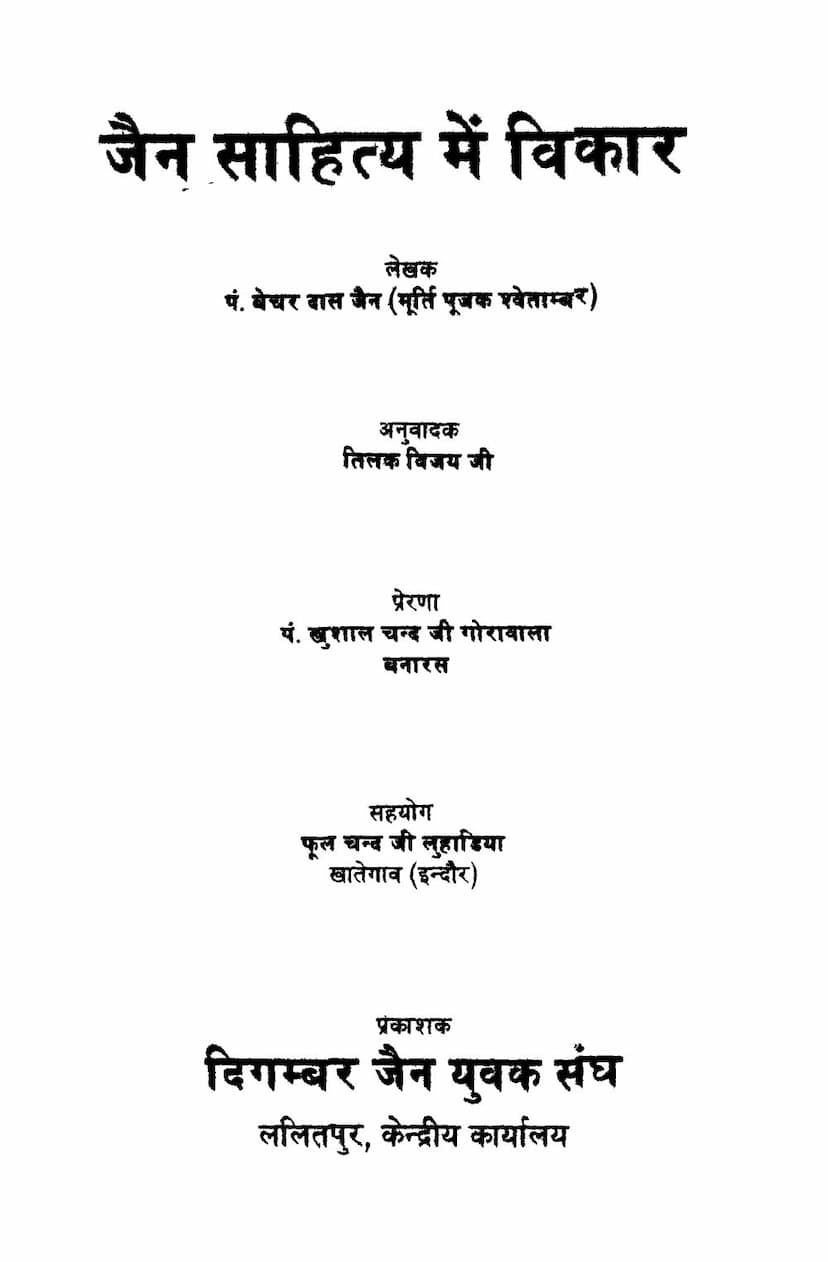Jain Sahitya Me Vikar
Added to library: September 2, 2025

Summary
This is a comprehensive summary of the Jain text "Jain Sahitya me Vikar" (Changes/Deviations in Jain Literature) by Bechardas Doshi, translated by Tilakvijay. The book, published by Digambar Jain Yuvaksangh, is a critical examination of perceived deviations and corruptions that have entered Jain literature and practice over time, leading to the current state of the Jain community.
The author, Bechardas Doshi, a respected scholar from the Shwetambar sect, expresses deep concern over the Jain society's lack of knowledge about its own religious literature and history. He criticizes the prevalent tendency of blindly following religious leaders who are often ignorant of the true historical events and teachings of Mahavir. This ignorance, the author argues, is exploited by these leaders, leading the Jain populace astray with unscientific traditions presented as dharma.
The book aims to act as a lamp for thoughtful and inquisitive individuals within the Jain community, illuminating the truth behind historical practices and doctrines. The translator, Tilakvijay, mentions that the book was written about ten years prior to its Hindi translation and that it addresses crucial topics such as:
- Shwetambar-Digambarism: The author traces the origins and reasons behind the division into Shwetambar and Digambar sects, attributing it to the stubbornness, permissiveness, and lack of desire for liberation among religious leaders. He highlights that the foundation of this division is solely based on dogma and stubbornness, not on genuine differences in doctrine.
- Chaityavad (Idol Worship): The text critiques the practice of idol worship, particularly the excessive ornamentation of idols with jewelry and the dressing of deities in foreign attire, which the author considers to be irreligious and a mockery of true spiritual practice. He notes that society is spending vast sums of money on legal battles related to idols, which he deems a waste of valuable resources.
- Devadravyavad (Resources for Deities): The book discusses the concept of "Devadravya" (resources dedicated to deities) and questions its historical basis within Jain scriptures. The author argues that many of the practices associated with Devadravya are not supported by the original Agamas and have become a source of financial litigation and exploitation. He laments that the very practices intended to uphold dharma have now become detrimental.
- Agamvad (The Authority of Agamas): The author analyzes various scriptures, criticizing the way certain stories and interpretations have been used by contemporary religious leaders to entertain and mislead their followers, often at the expense of genuine spiritual understanding. He expresses surprise at how the trading community, adept in business, can so readily accept and propagate such teachings without critical examination.
The author emphasizes that true Jainism is a religion based on inquiry and verification, not blind faith. He laments that the current Jain society, by clinging to blind faith and traditions, is bringing about its own downfall in this scientific age. He calls for a cleansing of Jain literature from these "deviations" through the pure river of Anekantavada (the doctrine of manifold aspects) and urges the community to take preventive measures against future calamities.
The book is characterized by its research-based approach, critical analysis, and the author's deep emotional engagement with the plight of the Jain community. Bechardas Doshi's writing is described as authoritative and well-considered, reflecting a profound understanding of Jain philosophy and history. The translator, Tilakvijay, hopes that the book will enlighten the thoughtful Jain community and encourage them to reflect on these critical issues.
Throughout the text, the author repeatedly highlights the contrast between the original, simple, and ethical teachings of Mahavir and the elaborate, often contradictory, and self-serving practices that have evolved over centuries, leading to schisms, commercialization of religion, and a decline in genuine spiritual pursuit. He asserts that the core of Jainism, as taught by Mahavir and his immediate disciples, was about self-discipline, ethical conduct, and the pursuit of liberation, free from unnecessary external embellishments or rigid, unquestionable dogma. The author's primary concern is to bring the Jain community back to the original spirit and teachings of their faith.